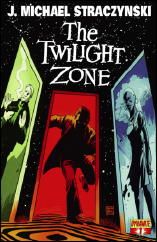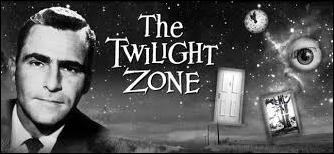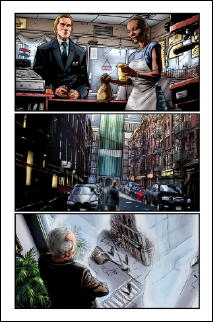Sun 30 Mar 2014
A Comic Book Review by Jonathan Lewis: J. MICHAEL STRACZYNSKI – The Twilight Zone (2014).
Posted by Steve under Comic Books, Cartoons, Comic Strips , Reviews , Science Fiction & Fantasy[7] Comments

J. MICHAEL STRACZYNSKI – The Twilight Zone, Volume 1 #1: The Way Out. Dynamite Entertainment, comic book, 2014. Illustrated by Guiu Vilanova. Colored by Vinicius Andrade. Lettered by Rob Steen. Main cover by Francesco Franvavilla.
Carol Kramer Serling, widow of the late Rod Serling, remarked in a 1987 interview that, for the legendary creator of The Twilight Zone, “the ultimate obscenity is not caring, not doing something about what you feel, not feeling! Just drawing back and drawing in; becoming narcissistic.†In many ways, that very spirit of refusing to turn away from perceived social injustice animates the narrative in the brilliantly executed first issue of J. Michael Stracyznski’s The Twilight Zone comic book series (2014).
The tall, muscular, and blonde-haired Trevor Richman wears a suit and tie, works in New York finance, and cheats on his blonde-haired girlfriend, Natalie Kyle, with the dark-haired Sandra. He is about to be indicted for white-collar criminal offenses. Knowing it’s only amount of time before the FBI catches up with him, Richman seeks the services of the mysterious, gray-bearded Martin Wylde, whose firm developed a nanotechnology pill which, if ingested, transforms so completely that they assume complete new identities, complete with new blood type, eye color, and fingerprints.
Richman takes the pills and transforms into a new man — literally. Thomas Riley (same initials!) has dark hair — similar to Sandra and unlike Natalie. When Richman/Riley goes in for a cleaning appointment, the dentist tells him that his jaw is changing on its own and that he basically appears to have a new dental profile.
Riley, unlike his former self as Richman, does not wear a tie; instead, he wears jeans. Although, suffice it to say, he didn’t need to take a pill to do either of those things. Riley, it would seem, still has Richman’s personality and memories, leading the reader to believe that the change, dramatic as it was, was merely physical.

Even a casual reader would notice the strong political subtext in “The Way Out.” Cheating Wall Street bankers, like Richman, are villainous. Wylde’s clients, we learn, are tyrants and dictators, war criminals, torturers, and … “a growing number of people from the financial services industry.â€
And one can almost hear echoes of Serling, known for introducing the theme of racial equality into his work, in Richman/Riley’s response to an African-American, a patron of a coffee shop, who wants white collar criminals in jail: “The legal system doesn’t work the same way for people at the top as it does for — well, for everyone else, for the people with power, for the people who matter…there’s always a way out.â€

Vilanova and Andrade’s visual rendering of the patron’s face, ostensibly reacting to Richman/Riley’s over-the-top statement, is stunning. Still, one wonders whether the characters deliberately refer to the “FEC†and the “Federal Exchange Commission†or whether this was an oversight on the part of the author who should have written “SEC†and “Securities and Exchange Commission†instead. (The FEC is the Federal Election Commission, not really relevant to this story.)
Unlike far too many comic books appearing on the shelves these days, the first issue of The Twilight Zone is well written, deals with serious subject matter, and contains artwork and coloring that works exceptionally well with the story. There were a couple instances, however, where I had to double check whether I understood correctly which character was which. But those moments were few and far between.
In conclusion, Stracyznski, who wrote for the 1985 television reboot of The Twilight Zone has written the type of story one could easily imagine appearing the television show bearing its name. A tale, it should be noted, which with a dramatic cliffhanger — one I certainly didn’t see coming. I’m planning on going to the comic book store later this week and purchasing the next few issues in the series. I want to know how it all turns out.
March 30th, 2014 at 10:32 pm
JMS (as Straczynski is also known) has a large following among the sf crowd. His BABYLON 5 was the first TV series to successful series take advantage of the fan base getting together on the internet. B5 became a successful cottage industry all on its own, with spin-offs, books, etc. JMS has done other TV and film but lately has been writing for some of the biggest comic books in the industry (SUPERMAN, WONDER WOMAN). He has yet to again reach the success he had with B5 (my favorite sf TV series of all time), but he maintains an connection with his fans unlike few other writers.
March 31st, 2014 at 4:12 pm
This would seem to be a science fictionalized version of a story by Robert Sheckly that was dramatized on the original Twilight Zone series. No accusation intended there, it just has a similar theme, it may go well beyond the original. Indeed from the description Jonathan gives they seem to have added elements of David Ely’s Seconds as well.
TZ has had several comic book incarnations since the first by Gold Key, and oddly enough they have all been attractive well done projects.
March 31st, 2014 at 5:16 pm
All good points.
There’s actually a reference to Kenneth Lay (Enron) in the story as well.
I definitely need to get issues #2-3 (I think that’s all that’s out so far) in this series and see where the story goes
March 31st, 2014 at 7:58 pm
Michael, Comment #1:
Perhaps someday, in a separate post, you can write a short essay on BABYLON 5, and why it’s your favorite SF TV show of all time. I watched all or at least most of Season One, and had no interest in continuing. (I am sure you will tell me that that is the point at which the series finally became interesting.)
March 31st, 2014 at 10:42 pm
B5 was an arc show. It was conceived as a book with each season being a separate section of the one book. Unlike most arc shows where they have a vague idea where they are going and make it up as they go, B5 had a detailed (though flexible) bible before the pilot was even filmed. It was one of the first TV series to kill off the lead in the first season (where that story line went would resurface a few seasons later). Every question was answered but the answers would create more questions.
Like most arc shows it hooked you into the large story by keeping you guessing about everything else. Anything could happen and when it did it usually entertainingly surprise you.
With the exception of a few episodes in the first season JMS wrote and produced every episode giving it a single voice much like Rod Serling’s TWILIGHT ZONE. It was an early adapter of CGI special effects that amazed when first aired but look cheesy today.
It offered a different view of the future of mankind than STAR TREK or STAR WARS though STAR TREK DEEP SPACE NINE that came out about the same time had a similar point of view. It was a POV I found more entertaining than other SF TV/films.
April 2nd, 2014 at 2:42 pm
I came to B5 in the second season and it took several episodes to win me, but toward the end it not only became more interesting it did the only halfway realistic battle in space I have ever seen, replete with FTL ships appearing and disappearing suddenly to fire at each other and the complexities that provided for acquiring targets.
The diplomatic background was also more complex and much more interesting than Deep Space Nine — at least to me.
Most science fiction series seem to think Horatio Hornblower in space should be taken literally with space ships motionless in the vacuum slugging it out like three masted warships or buzzing around like Mustangs and Spitfires ala Star Wars. It was nice to see someone had actually read their Niven and Pournelle (The Mote in God’s Eye) and A.E. Van Vogt (“Black Destroyer”).
Still, for me, Farscape surpassed B5 by a considerable amount.
April 2nd, 2014 at 9:38 pm
6. David, FARSCAPE is a good choice (as would FIREFLY), but I never cared about the characters and I couldn’t get involved with the stories because of it.
CRUSADE, JMS’ spinoff from B5, showed promise but like many others never got a chance to develop.